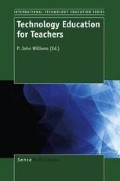Abstract
Teachers are under no obligation to accept or develop a philosophy about what they do, but there is an obligation to think about what they do and why they do it; it is irresponsible not to.
Access this chapter
Tax calculation will be finalised at checkout
Purchases are for personal use only
Preview
Unable to display preview. Download preview PDF.
References
Archer, B. (1986). The Three R’s in Technology in Schools. A. Cross and B. McCormick (Eds.) Milton Keynes: Open University Press.
Anderson, C. (2012). Makers: The New Industrial Revolution. New York: Crown Business, 2012
Australian Education Council (1989). Common and Agreed National Goals for Schooling in Australia. Melbourne: The Curriculum Corporation.
Bellamy, E. (1897). Equality. New York: Appleton.
Bronowski, J. (1964). Science and Human Values. London: Pelican.
Butts, F. (1980). Curriculum for the educated citizen. Educational Leadership, October, p. 6–9.
Chaplin, M. (1987). Technology and the humanities. The Weaver, 5(2), 2.
Crawford, M. (2009). Shop Class as Soulcraft. New York, Penguin.
de Camp, L.S. (1963). The Ancient Engineers. New York: Doubleday.
Ellul, Jacques. (1965). The Technological Society. London: Jonathon Cape.
Educational Policies Commission (1944). Imperative Educational Needs of Youth. Wash D.C.: National Educational Association.
Feibleman, J. (1982). Technology and reality. The Hague: Martiness Nijhoff Publishers.
Frey, R. (1989). A Philosophical Framework for Understanding Technology. Journal of Industrial Teacher Education, 27(1), 23–35.
Goodman, Paul. (1968). People or Personnel. New York: Vintage Books.
Government of India. (1986). National Policy of Education. http://www.educationforallinindia.com/
Hogan, G. (1991). President writes. Technology and Design Education 2(3), 6.
Kitwood, T. (1980). The world refashioned for human use. NUQ, 483–504.
Knight, G. (1982). Issues and Alternatives in Educational Philosophy. Berrien Springs, MI: Andrews University Press.
Mesthene, E. (1970). Technological Change. Cambridge, Mass.: Harvard University Press.
Muller, H. (1971). The Children of Frankenstein. Indiana: Indiana University Press.
Mumford, L. (1934). Technics and civilization. Chicago: The University of Chicago Press.
Pacey, A. (1984). The culture of technology. Cambridge, Mass: MIT Press.
Pannabecker, J. (1991). Technological Impacts and Determinism in Technology Education: Alternate Metaphors from Social Constructivism. Journal of Technology Education, 3(1), 43–54.
Playfair, L. (1861). Photogrpahy at the Industrial Exhibition of 1862. British Journal of Photography, August 1, 263–264.
Scott, P. (1987) The empire of total technology. The Times Higher Education Supplement, September 4, p. 2.
Shermis, S. (1967). Philosophic Foundations of Education. New York: D.Van Nostrand Company.
Singer, C; Holmyard, E. & Hall, A. (Eds) (1958) A history of Technology. Oxford: Clarendon Press.
Walden, D. (1981). The two faces of technological utopianism. The Journal of General Education, 33(1), 24–30.
Weinberg, Alvin M. (1966). Can technology replace social engineering? University of Chicago Magazine, 59, 6–10.
Author information
Authors and Affiliations
Editor information
Editors and Affiliations
Rights and permissions
Copyright information
© 2012 Sense Publishers
About this chapter
Cite this chapter
Williams, P.J. (2012). Introduction. In: Williams, P.J. (eds) Technology Education for Teachers. International Technology Education Studies. SensePublishers, Rotterdam. https://doi.org/10.1007/978-94-6209-161-0_1
Download citation
DOI: https://doi.org/10.1007/978-94-6209-161-0_1
Publisher Name: SensePublishers, Rotterdam
Online ISBN: 978-94-6209-161-0
eBook Packages: Humanities, Social Sciences and LawEducation (R0)

